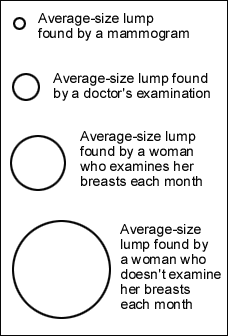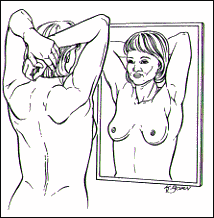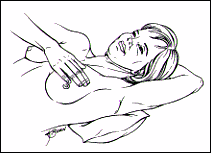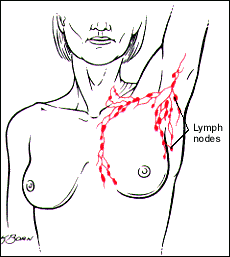|
Today
is:
Breast Cancer:
Steps to Finding Breast Lumps Early

Download Free
Exam Chart.
How can
I find breast cancer early?
The best way to find breast lumps that may be cancer is to do 3 things:
- Have
regular mammograms.
- Have your
doctor check your breasts.
- Check
your breasts yourself every month.
Doing all of
these things gives you the best chance to find cancer as early as you can.
Finding breast cancer early makes treatment much easier and more effective.
More than 90 out of 100 women whose breast cancer is found early will be
cured.
What is a mammogram?
A mammogram is the most effective way to
find breast cancer early, up to 2 years before the lump is even large
enough to feel. A mammogram is a special kind of x-ray of your breasts.
The amount of radiation used in the x-ray is very small.
Mammograms detect cancer
because cancer is denser (thicker) than the normal part of the breast. A
radiologist will look at the x-rays for signs of cancer or other breast
problems.
|

|
How is a mammogram performed?
Your breast will rest on a shelf and the x-ray machine
will be slowly pressed against your breast until you feel pressure. This
pressure is needed to spread your breast out so that a better x-ray can be
taken. The x-ray takes just 1 or 2 minutes, and the entire process usually
takes no more than about 20 minutes.
Do mammograms hurt?
Mammograms can
be uncomfortable. But they don't take very long. You may find that planning
to have your mammogram shortly after your period makes it less
uncomfortable. Your breasts may be less tender at this time.
How often should I get a mammogram?
Every 1 to 2
years beginning when you're 30. Talk with your doctor when it's time for
your breasts to be checked.
How often should I check my breasts?
Every month beginning at about age 20. At this early age, any small
lumps are probably just normal breast glands and ducts. Over time you will
get used to how your breasts normally feel so that you're able to tell if a
new lump appears.
Check your
breasts a few days after your period when your breasts aren't so sore. If
you don't have periods or if they come at varying times, check your breasts
at the same time every month.
|
How do I check for lumps?
Start by
standing in front of a mirror. Look at your breasts with your arms at
your side, with your arms raised behind your head, and with your arms on
your hips and your chest muscles flexed.
Next, lie
down with a pillow under your left shoulder. Put your left hand behind
your head and feel your left breast with the pads of the 3 middle fingers
on your right hand. Start at the outer edge and work around your breast
in circles, getting closer to your nipple with each circle. After you've
finished checking your breast, squeeze your nipple gently and look for
discharge (fluid coming out of the nipple).
Do the same thing
to your right breast with a pillow under your right shoulder.
|



|
Be sure to include the area up to your
collarbone and out to your armpit. You have lymph nodes in this area.
Cancer can spread to lymph node tissue.

Changes to look for in your breasts
- Any new lump (which may or may not be
painful or tender)
- Unusual thickening of your breasts
- Sticky or bloody discharge from your
nipples
- Any changes in the skin of your nipples or
breasts, such as puckering or dimpling
- An unusual increase in the size of one
breast
- One breast unusually lower than the other
__________________________________________________________
Reviewed/Updated:
09/04
Created: 2000
This article
provides a general overview on this topic and may not apply to everyone. To
find out if this article applies to you and to get more information on this
subject, talk to your family doctor.
"Reprinted by permission of the American Academy of Family Physicians
for educational purposes.
Copyright
© 1999-2004 American Academy of Family
Physicians
Back to the top
|